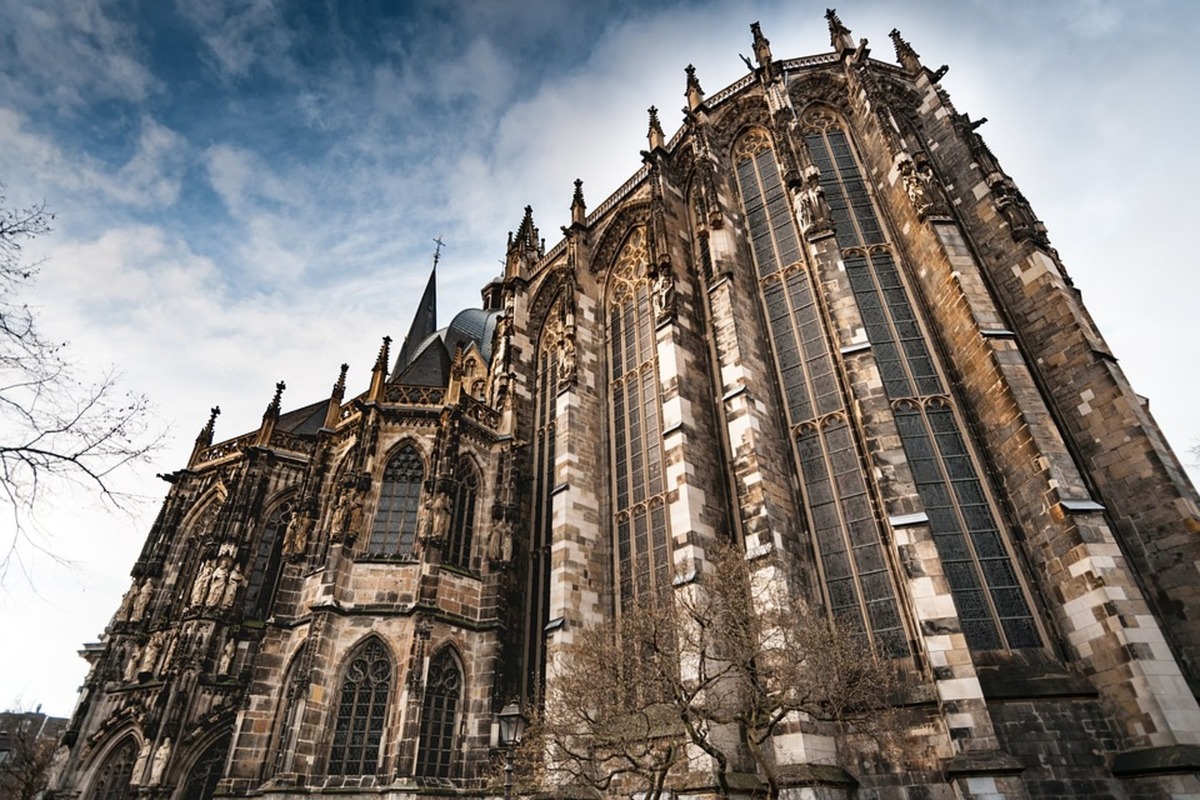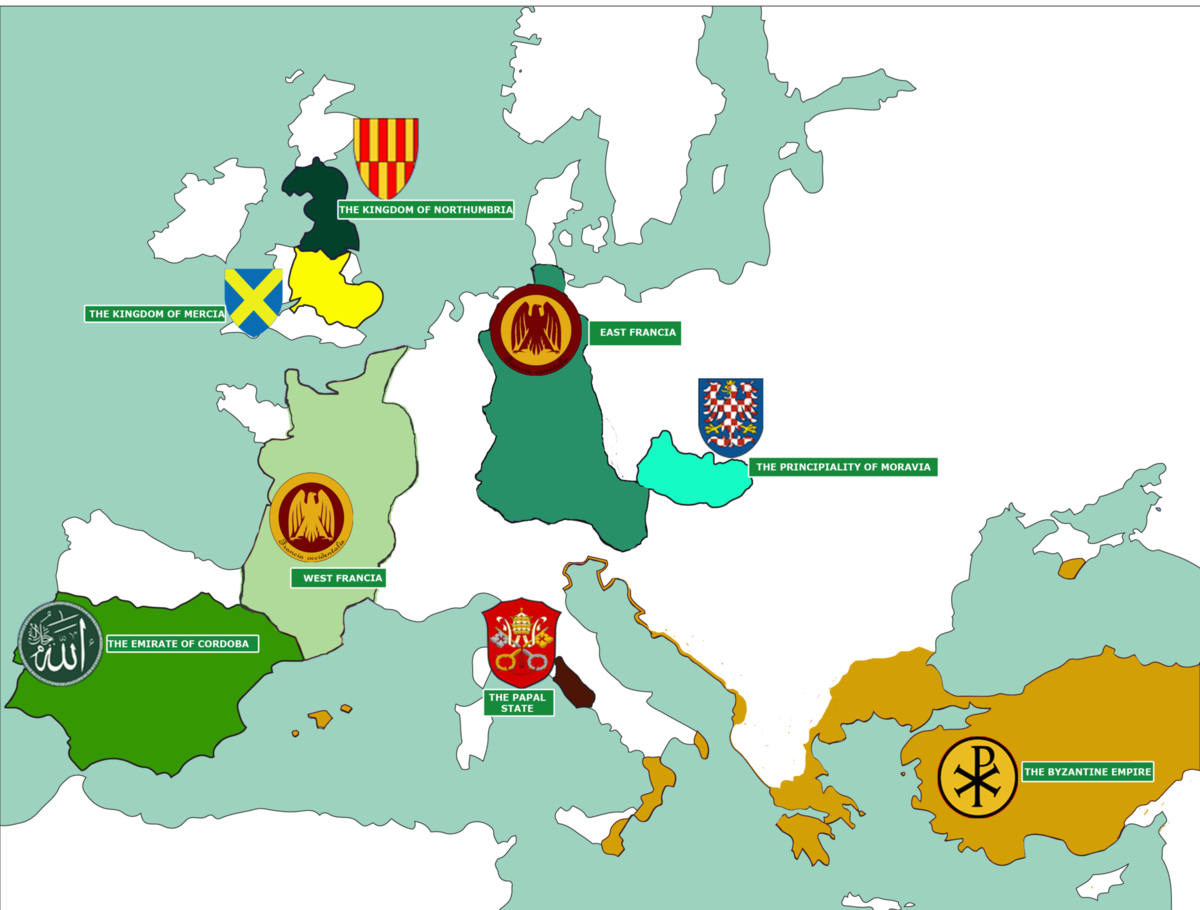The European Championship 868.
The migrations of various “barbaric” tribes, as well as Arab conquests between the 5th and the 8th centuries, have fundamentally changed the political map of Europe. Although the emperor of the Eastern Roman (or Byzantine) Empire formally held power throughout its territories, various Germanic rulers, who established their own state entities within the territories of the Empire, had become the true rulers of the West.
The Germanic Franks from northern Gaul will, in time, establish the most powerful kingdom in the West. Their ruler, Charlemagne, was granted with the title of Emperor by the pope in Rome (800), by which act he had, in the eyes of his contemporaries, after more than three centuries, carried forward the tradition of the existence of the Roman Empire. In times when irrational passions shaped reality, the perseverance of the continuity of the Roman Empire, or the passing on of the authority of Roman emperors to other rulers, had been of utmost importance (Translatio imperii). Referencing any kind of relation to classical antiquity (titles, vicinity to cities, origins of the family) represented a crucial way of legitimizing political power throughout the Middle Ages. The size and continuation of the Roman world have created the phenomenon of continuity in the medieval order. The aspiration to a universal imperial rule, was justified in his way, or the importance of one’s own state was attempted to be elevated by calling upon former glory. Through an agreement between Charlemagne’s heirs, the territories of the Frankish Empire were divided into the Western, Eastern, and Middle Francia (848). The only authoritative criterion in the division was that the brothers were supposed to get shares of equal value, and the oldest, Lothair, inherited both imperial residences, Aachen and Rome.
The second half of the 9th century was marked by Viking conquests. Coming from Scandinavia, one group raided and settled the Anglo-Saxon kingdoms in Britain, the second group threatened the cities on the North Sea and the king of West Francia, and the third moved in the direction of the eastern rivers which formed the Volkhov-Dnieper axis, where they imposed their rule onto Slavic cities in those lands. In Central Europe, a conflict between the Roman and Constantinople Churches over the spreadingof its influence throughout Great Moravia ensued, which will result in the persecution of the followers of Byzantine missionaries, who will, henceforth, begin to spread the first Slavic alphabet among the Slavs of south-eastern Europe. The specificity of the Early Medieval Period was in that religious questions, due to the non-existence of strong secular states, had often led to serious struggles. Moreover, religious institutions were the ones who, in most cases, determined political priorities.In fact, the second half of the 9th century, especially during the time of Patriarch Photios, was marked by increased intensity of conflicts between the Eastern and Western Churches. They differed in the stance on who the real representative of Christ on earth is. In addition to that, there were differences between rites, worship of Icons, language of the liturgy, celibate of the priests etc. However, their differences are primarily of a historical character: the Western Empire had taken upon itself to deal with the issues of the Empire, and “nurture” the world. It had also inherited the hierarchy, centralism, as well as Rome itself, from the Empire, and had dealt with numerous political and social issues. As opposed to this, the Eastern Church found itself in the Early Medieval Period within the framework of a survived, strong Empire, which did not expose it to either the tasks, or the dangers of worldly expansion. It had ruled the Church as if it were its subject, and limited it to tasks which were exclusively spiritual in nature. Generally, the Church had for centuries, both before and after the 9th century, dominated the intellectual life, and the Bible, the faith in which had to be unconditional, served as a frame of reference for contemplating both the world and that which was considered holy. Latin, as the language of the Western Church, had spread throughout territories which had accepted the religious supremacy of Rome, and it will also become the language of education, as well as the official language of numerous states, where it will be used by both the nobility and the clergy in diplomatic documents of public and private institutions. As is the case with writing, the measurement of time had stayed in the domain of the powerful throughout a great part of the Middle Ages, a factor of their power. The masses do not own their time, they are incapable of determining it. They listen to the time forced upon them from the bell towers, by the trumpets and horns.

Sources
Sources for text:
- Marc BLOCH, Feudalno društvo, Zagreb, 2001.
- Fernard BRAUDEL, Civilizacije kroz povijest, Zagreb, 1990.
- Ulf DIRLMEIER, Povijest Njemačke, Zagreb, 1999.
- Niall FERGUSON, Kolos, Zagreb, 2011.
- Felipe FERNANDEZ-ARMESTO, Narodi Europe, Zagreb, 1997., 297;
- Grupa autora, Povijest: Razvijeni srednji vijek , knjiga VII., Zagreb 2008.
- Grupa autora,''Širenje znanja'': Velika ilustrirana enciklopedija, Zagreb, 2009.
- Snježana KORDIĆ, Jezik i nacionalizam, Zagreb 2010.
- Jacques LE GOFF, Civilizacija srednjovjekovnog Zapada, Zagreb 1998.
- Philippe WALTER, Kršćanska mitologija : svetkovine, obredi i mitovi srednjega vijeka, Zagreb, 2006.
- ''Karlo I. Veliki'', (http://www.enciklopedija.hr/Natuknica.aspx?ID=30547)
- ''Legacy of the Roman Empire'', (http://en.wikipedia.org/wiki/Legacy_of_the_Roman_Empire)
- Salmedin MESIHOVIĆ, ''Edicija XII. stoljeća Rimskog svijeta'', 11, (http://www.academia.edu/3615992/XII_stoljeca_rimskog_svijeta)
- ''srednjovjekovni latinski'', (http://hebeta.lzmk.hr/natuknica.aspx?ID=57611)
Sources for maps:
- ''Ian Mladjov's Resources '',https://sites.google.com/a/umich.edu/imladjov/maps
- ‘’Central europe 9th century’’, https://commons.wikimedia.org/wiki/File:Central_europe_9th_century.png
- ''Little DNA project'': http://www.geocities.ws/littlednaproject/facts.htm
- ''Papal states'': http://pages.uoregon.edu/mapplace/EU/EU19%20-%20Italy/Maps/EU19_04.jpg
- ''History of Majorca'': http://www.majorcanvillas.com/majorcainfo-history.asp
- ''Treaty of Mersen'', https://en.wikipedia.org/wiki/Treaty_of_Meerssen
Izvor za fotgrafiju:
https://pixabay.com/en/dom-aachen-aachen-cathedral-2461913/
